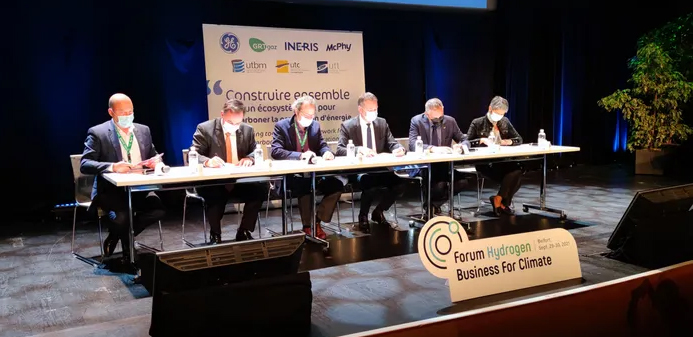GE, GRTgaz, Ineris, McPhy and the French network of Universities of Technology sign MOU to boost research and innovation around hydrogen.
Bringing together French industrial champions and key academic institutions, this MOU intends to advance research and innovation around hydrogen for all uses, including low-carbon projects for gas power generation and industrial process applications
This MOU establishes a hydrogen (H2) research framework with dedicated resources in France to design and conduct a joint program, fostering collaboration and innovation in support of the energy transition.

General Electric, GRTgaz, Ineris, McPhy and the network of universities of technology in France (UTBM, UTC et UTT) today announced the signing of a Memorandum of Understanding creating a hydrogen research framework for power generation.
This collaboration aims to strengthen research and development knowledge on hydrogen production, transport, storage, distribution and safety for all uses including power generation. It allows the creation of a research cluster based in France that will specifically evaluate the concrete application of hydrogen as a fuel for gas turbine power generation. In addition, this work also will address the modelling of their operation, the development of accessories and specific components, safety and certification of the systems.
This collaboration involves :
- GE Gas Power - a global leader in natural gas supply technology, services and solutions,
- GRTgaz - a European leader in natural gas transmission and a world expert in gas systems,
- Ineris - the French National Institute for Industrial Environment and Risks, an industrial and commercial public establishment under the aegis of the Minister for Environment,
- McPhy - an industrial group, specialized in zero-carbon hydrogen production and distribution equipment (electrolyzers and refuelling stations),
- The Universities of Technology at Belfort-Montbéliard (UTBM) - a leading centre for hydrogen research in France, Compiègne (UTC) and Troyes (UTT), which constitute a unique, leading, and innovative network of scientific, cultural and professional universities, training first-class engineers and doctors.
This new hydrogen research framework for power generation will encompass four research streams focused on different aspects of the Hydrogen Combined Cycle Gas Turbine (CCGT) value chain:
- System Integration & Operability Modeling, aiming at developing integrated model of gas turbine and hydrogen storage, blending and consumption, and aiming at designing economic solutions that meet marketplace needs. That model aims at developing a comprehensive solution, centered around a hydrogen-fueled gas turbine that will provide power on demand and ensure grid stability in a carbon-reduction context,
- Accessories and Balance of Plant Components development for Hydrogen, readiness including the development of robust equipment (valves, hoses, seals, analyzers/sensors, flow meters, etc.), simplification of purge systems, and gas separation technology. This stream therefore focuses on the qualification of all the peripheral systems that are required for plant operation, to enable the conversion of existing gas-fired plants to higher hydrogen fuel levels,
- Safety and Certification of Components and Systems, to enable highest safety standard,
- Test platform equipped with an electrolyzer, to put into practice the developed concepts and solutions and validate them on an industrial scale. This includes improving the capabilities of the hydrogen test bench at the GE Gas Power production site in Belfort, where the 9HA advanced gas turbine is manufactured.
In parallel, the creation of a hydrogen research hub will allow the hosting of PhD students from the relevant academic institutions, as well as providing initial seed funding and oversight to launch the research program. This collaboration will enable stakeholders to join forces to apply to calls for interest for major European or National innovative projects dealing with the design, development, production and use of H2 systems and successive stages (feasibility, design, setup/erection and commissioning of prototypes) relating to the project.